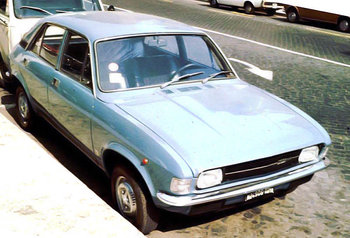Innocenti Regent
The vehicle was built in Italy by Innocenti in 1974 and 1975 and sold as the Innocenti Regent. The Austin Allegro was a small family car that was manufactured by British Leyland under the Austin name from 1973 until 1983. In total, 642,350 Austin Allegros were produced during its ten year production life, with the majority being sold on the British market.
Design
The Allegro was designed as the replacement for the popular Austin 1100/1300, designed by Sir Alec Issigonis and John Grant. As with the Morris Marina, the car can be seen with hindsight as symptomatic of the enormous difficulties facing British Leyland during that period. The key factor that British Leyland appear to have missed is that a much more useful and popular form of car, the hatchback, was emerging in Europe, with designs such as the Volkswagen Golf. This configuration would go on to dominate the market for small family cars in the space of a few years. British Leyland stuck to the more traditional and less versatile booted design when they launched the Allegro. This was because of internal company politics; it had been decided that the Austin Maxi should have a hatchback as its unique selling point, and that no other car in the company's line-up was allowed one. This decision hamstrung both the Allegro and the Leyland Princess, both designs naturally suited to a hatchback yet not given one.
The Allegro used front-wheel drive, using the familiar A-Series engine with a sump-mounted transmission. The higher-specification models used the SOHC E-Series engine (from the Maxi), in 1500cc and 1750cc displacements. The two-box saloon bodyshell was suspended using the new Hydragas system (derived from the previous Hydrolastic system used on the 1100/1300).
Stylistically, it went against the sharp-edged styling cues that were becoming fashionable (largely led by Italian designer Giorgetto Giugiaro), and featured rounded panel work. The original styling proposal, by Harris Mann, had the same sleek, wedge-like shape of the Princess, but because British Leyland management, keen to control costs, wanted to install the existing E-Series engine and bulky heating system from the Marina, it became impossible to incorporate the low bonnet line as envisaged: the bodyshell began to look more and more bloated and tubby. This was acceptable to BL, however, which according to Jeff Daniels' book - British Leyland, The Truth About The Cars, published in 1980 - wanted to follow the Citroën approach of combining advanced technology with styling that eschewed mainstream trends to create long-lasting "timeless" models. Its unfashionable shape was thus not an problem. The final car bore little resemblance to Mann's original concept that had originally been conceived as an 1100/1300 re-skin. This, as well as British Leyland's faith in it as a model that would help turn the company around, led to it earning the early nickname of the "flying pig". The car was offered in the usual range of British Leyland colours; notably beige, brown, and matt green.
Dimensions
- Overall length: 3,852 mm (152 in)
- Overall width: 1,613 mm (63 in)
- Height: 1,398 mm (55 in)
- Wheelbase: 2,442 mm (96 in)
- Track: 1,346 mm ( 53 inches)
- Weight: 869 kg (1,915 lb)
- Tyre size: 145 x 13 (155 x 13 on 1750 and Sport)
| 1947-1971 Lambretta (motorscooter) | 1960-1967 A40/A40S Berlina/Combinata - hatchback Austin A40 Farina | 1961-1968 950/1100 Spider - roadster Austin-Healey Sprite Mk.II | 1963-1974 IM3/IM3S/Austin I4/I5 - sedan Morris 1100 | 1965 -- 186 GT - coupé with a 6 cyl. Ferrari Dino engine | 1965-1975 Mini - Mini | 1974-1975 Regent - sedan Austin Allegro | 1974-1975 Innocenti Mini - 90L and 120L Bertone rebodied Mini | 1975-1982 Innocenti De Tomaso - De Tomaso further development of Innocenti Mini | 1983-1992 3C - De Tomaso-rebodied Daihatsu Charade | 1991-1993 Koral - Yugo Koral rebadged for the Italian market | 1991-1996 Elba - European version of the Brazilian Fiat Elba |
